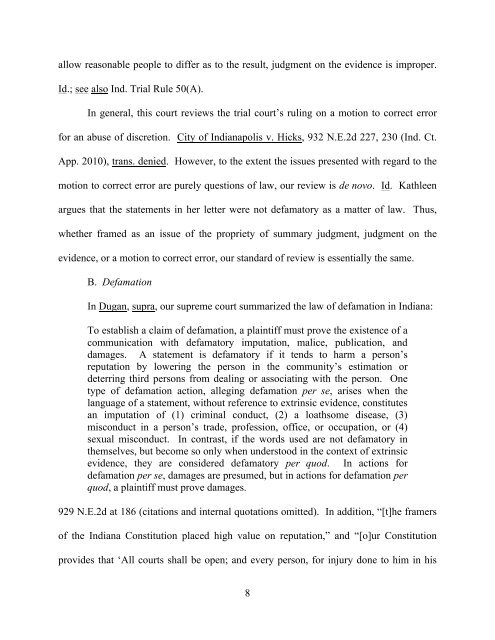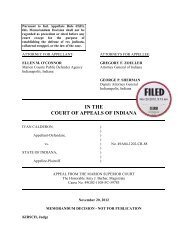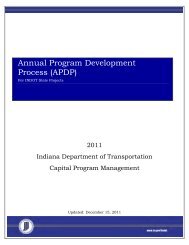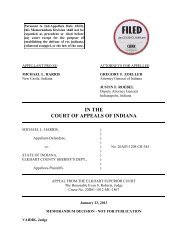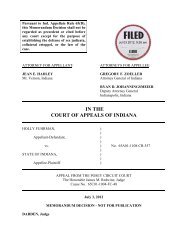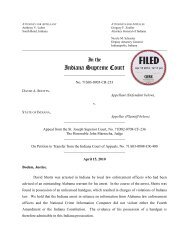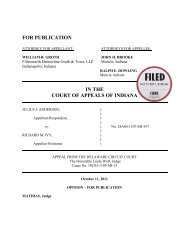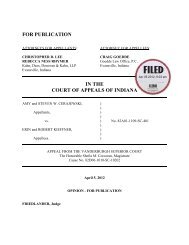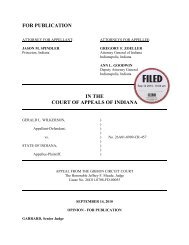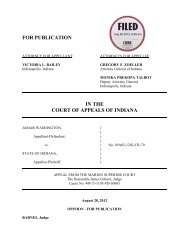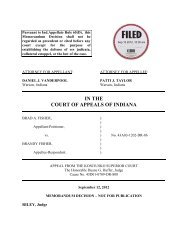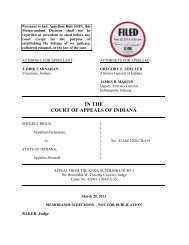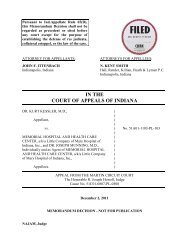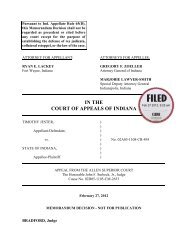Kathleen G. Babchuk v. Kirk J. Daniels - State of Indiana
Kathleen G. Babchuk v. Kirk J. Daniels - State of Indiana
Kathleen G. Babchuk v. Kirk J. Daniels - State of Indiana
Create successful ePaper yourself
Turn your PDF publications into a flip-book with our unique Google optimized e-Paper software.
allow reasonable people to differ as to the result, judgment on the evidence is improper.<br />
Id.; see also Ind. Trial Rule 50(A).<br />
In general, this court reviews the trial court’s ruling on a motion to correct error<br />
for an abuse <strong>of</strong> discretion. City <strong>of</strong> <strong>Indiana</strong>polis v. Hicks, 932 N.E.2d 227, 230 (Ind. Ct.<br />
App. 2010), trans. denied. However, to the extent the issues presented with regard to the<br />
motion to correct error are purely questions <strong>of</strong> law, our review is de novo. Id. <strong>Kathleen</strong><br />
argues that the statements in her letter were not defamatory as a matter <strong>of</strong> law. Thus,<br />
whether framed as an issue <strong>of</strong> the propriety <strong>of</strong> summary judgment, judgment on the<br />
evidence, or a motion to correct error, our standard <strong>of</strong> review is essentially the same.<br />
B. Defamation<br />
In Dugan, supra, our supreme court summarized the law <strong>of</strong> defamation in <strong>Indiana</strong>:<br />
To establish a claim <strong>of</strong> defamation, a plaintiff must prove the existence <strong>of</strong> a<br />
communication with defamatory imputation, malice, publication, and<br />
damages. A statement is defamatory if it tends to harm a person’s<br />
reputation by lowering the person in the community’s estimation or<br />
deterring third persons from dealing or associating with the person. One<br />
type <strong>of</strong> defamation action, alleging defamation per se, arises when the<br />
language <strong>of</strong> a statement, without reference to extrinsic evidence, constitutes<br />
an imputation <strong>of</strong> (1) criminal conduct, (2) a loathsome disease, (3)<br />
misconduct in a person’s trade, pr<strong>of</strong>ession, <strong>of</strong>fice, or occupation, or (4)<br />
sexual misconduct. In contrast, if the words used are not defamatory in<br />
themselves, but become so only when understood in the context <strong>of</strong> extrinsic<br />
evidence, they are considered defamatory per quod. In actions for<br />
defamation per se, damages are presumed, but in actions for defamation per<br />
quod, a plaintiff must prove damages.<br />
929 N.E.2d at 186 (citations and internal quotations omitted). In addition, “[t]he framers<br />
<strong>of</strong> the <strong>Indiana</strong> Constitution placed high value on reputation,” and “[o]ur Constitution<br />
provides that ‘All courts shall be open; and every person, for injury done to him in his<br />
8


